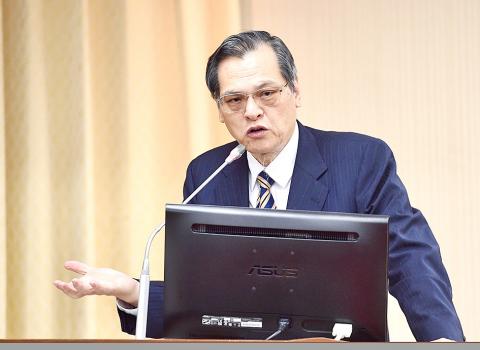About 100,000 Taiwanese have applied for residency in China since Beijing began issuing residency cards to Taiwanese working or living in China in September last year, Mainland Affairs Council (MAC) Minister Chen Ming-tong (陳明通) said yesterday.
Chen was responding to questions from Chinese Nationalist Party (KMT) Legislator Lin Li-chan (林麗蟬) about China’s residency card at a meeting of the Legislative Yuan in Taipei.
Beijing’s issuance of the cards to Taiwanese, as well as people from Hong Kong and Macau, who have been legally living, working or studying in China for more than six months, is seen by some as a political tactic to gain support among Taiwanese.

Photo: Peter Lo, Taipei Times
Chen added that Taiwanese who have acquired a Chinese residency card, but failed to report it to Taiwanese authorities could be fined NT$10,000 to NT$50,000 once the law is amended.
The MAC has an open mind regarding Taiwanese studying or working in China needing a residence permit, but they must register their card in Taiwan, he said.
However, China residency cardholders who return to Taiwan and seek to work in the public sector would have “to wait for a certain period,” Chen said, adding that the time frame is still being discussed.
The council has proposed an amendment to the Act Governing Relations Between the People of the Taiwan Area and the Mainland Area (臺灣地區與大陸地區人民關係條例), setting penalties and regulations constraining the citizenship of Taiwanese holding China residency cards.
The amendment bill is pending Cabinet approval prior to being delivered to the Legislative Yuan for review.

A Taiwanese software developer has created a generative artificial intelligence (AI) model to help people use AI without exposing sensitive data, project head Huang Chung-hsiao (黃崇校) said yesterday. Huang, a 55-year-old coder leading a US-based team, said that concerns over data privacy and security in popular generative AIs such as ChatGPT and DeepSeek motivated him to develop a personal AI assistant named “Mei.” One of the biggest security flaws with cloud-based algorithms is that users are required to hand over personal information to access the service, giving developers the opportunity to mine user data, he said. For this reason, many government agencies and

The National Fire Agency on Thursday said a series of drills simulating a magnitude 8.5 earthquake would be held in September to enhance the government’s emergency response capabilities. Since earthquakes cannot be predicted, only by continuously promoting disaster prevention measures could Taiwan enhance its resilience to earthquakes, agency Director-General Hsiao Huan-chang (蕭煥章) said in a news release. The exercises would be held to mark annual National Disaster Prevention Day on Sept. 21, the aim of which is to test Taiwan’s preparedness and improve its earthquake resilience in case of a major temblor, Hsiao said. As part of those drills, an earthquake alert would

DEFENSE: The National Security Bureau promised to expand communication and intelligence cooperation with global partners and enhance its strategic analytical skills China has not only increased military exercises and “gray zone” tactics against Taiwan this year, but also continues to recruit military personnel for espionage, the National Security Bureau (NSB) said yesterday in a report to the Legislative Yuan. The bureau submitted the report ahead of NSB Director-General Tsai Ming-yen’s (蔡明彥) appearance before the Foreign and National Defense Committee today. Last year, the Chinese People’s Liberation Army (PLA) conducted “Joint Sword-2024A and B” military exercises targeting Taiwan and carried out 40 combat readiness patrols, the bureau said. In addition, Chinese military aircraft entered Taiwan’s airspace 3,070 times last year, up about

STRICTER ENFORCEMENT: Taipei authorities warned against drunk cycling after a sharp rise in riding under the influence, urging greater public awareness of its illegality Taipei authorities have issued a public warning urging people not to ride bicycles after consuming alcohol, following a sharp rise in riding under the influence (DUI) cases involving bicycles. Five hundred and seven people were charged with DUI last year while riding YouBikes, personal bicycles, or other self-propelled two-wheelers — a fourfold increase from the previous year, data released by the Taipei Police Department’s Traffic Division showed. Of these, 33 cases were considered severe enough to be prosecuted under “offenses against public safety,” the data showed. Under the Road Traffic Management and Penalty Act (道路交通管理處罰條例), bicycles — including YouBikes and other